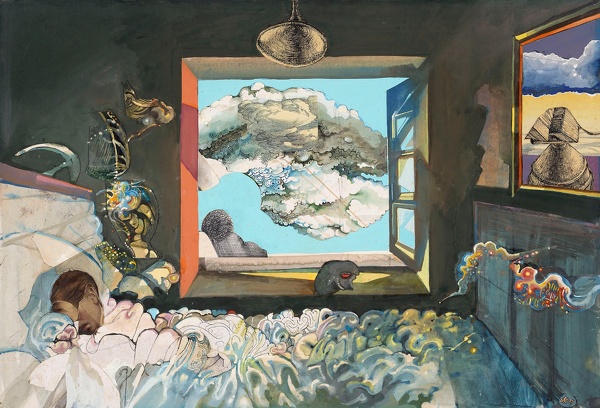

 Hover over the painting to magnify (there may be an initial delay while the magnified image is loaded)
Hover over the painting to magnify (there may be an initial delay while the magnified image is loaded)David Evans (1929-1988):
The Dream, late 1960's
Mounted (ref: 8181)
Signed with initials
See all works by David Evans collage/photomontage ink photo watercolour allegory architecture Canney Abstract Art design Garden industrial interiors landscape seascapes and skyscapes still lifes Evans David Evans (1929-1988) — The Period Charm of Thatcher's Britain David Evans at Young Gallery
Provenance: The Artist's Studio
Literature: "David Evans (1929-1988)", edited by Sacha Llewellyn & Paul Liss, published by Liss Llewellyn Fine Art, 2017. ISBN 978-0-9930884-6-9. Cat 38, page 64.
Evans' compositions belong to the Northern tradition of Hieronymus Bosch (1450-1516). Through heightened colour and narrative details his contemporary subjects resonate an underlying disquiet: I don't think anyone produces anything of value until it has actually got into the blood stream. In his love of story-telling, quirky humour and a delight in the ordinary, his pictures are also unequivocally British, especially in his commitment to producing watercolours intended for exhibition, rather than as studies for larger oil paintings.
Comparison to the large, idiosyncratic watercolours of Edward Burra (1905-1976) is inevitable, but in Evans' paintings there are also other clear genera-tional influences, from Keith Vaughan (1912-1977), by whom Evans was taught, to Peter Blake (b.1932), David Hockney (b.1937), Alan Reynolds (1926-2014), Lucian Freud (1922-2011), Francis Bacon (1909-1992), Graham Sutherland (1903-1980) and Eduardo Paolozzi (1924-2005).
Urban subjects similar to the repertoire of L.S Lowry (1887-1976), unfold against a backdrop of factories, concerts halls, sporting arenas, beaches, cafeterias and bars, museum interiors and shopping centres. Bill-boards, traffic congestion and fast food are very much in evidence. Night clubs are peopled predominantly by men (and the occasional drag-queen), a celebration of Evans’ homosexuality. Evans made his living whilst in London running a small classical music record shop, Record Roundabout, at 291 Brompton Road.
 British Abstract Art
British Abstract Art SOLD
SOLD





